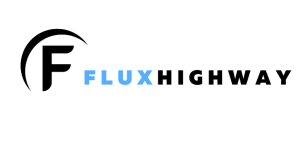The biggest challenge facing the internet and the blockchain today is centralization. Flux has created its completely decentralized infrastructure with a global community for an easy to use, multi-functional platform. As a cross-chain oracle, it is resilient to censorship and system failures. At the same time, it is built to scale and provide service solutions at enterprise levels. Recent events globally are pointing out the weakness of the current web structure and highlighting the importance of this project.

TABLE OF CONTENTS
- What Problems Does Flux Network (FLUX) Solve?
- Benefits of Flux Network (FLUX)
- How Does Flux Network (FLUX) Work
- How to Buy Flux Network (FLUX)
The Flux Network (FLUX) integrates a decentralized cloud computing network with cross-chain oracle capabilities. The goal of the project is to provide a trustless data layer to Web 3.0 applications. The network introduces a custom-made blockchain and a versatile utility token to the market to accomplish these tasks.
It is a new generation of scalable cloud infrastructure that is decentralized to its core. The platform allows users to perform several functions, one of which is to simply develop, manage as well as spawn applications on multiple servers at once, thus making it ready for Web 3.0 decentralized applications.
The Flux Ecosystem consists of several components making a fully operational suite of decentralized blockchain and computing services creating a service solution which can provide an AWS-like development environment that is decentralized along with being interoperable.
Related: https://fluxhighway.com/flux-coin-good-investment-above-resistance-price-performance-march-2022/
The native coin is Flux, a GPU mineable Proof-of-Work Coin used to provide an incentive for XDAO governance on-chain and mining rewards. Flux nodes make up the decentralized Web3 Computational Network – now with more than 6800 Flux nodes that are located all across the globe. Also, one of the major components of the platform is referred to as FluxOS that runs on top of Linux operating system – a most stable, enterprise level reliable system.
What Problems Does Flux Network Solve?
The Flux Network (FLUX) tackles one of the biggest issues facing the blockchain sector, centralization. In a decentralized ecosystem, any point of centralization creates a weak link in the network. One area where centralization has proven to be a real concern is with oracles.
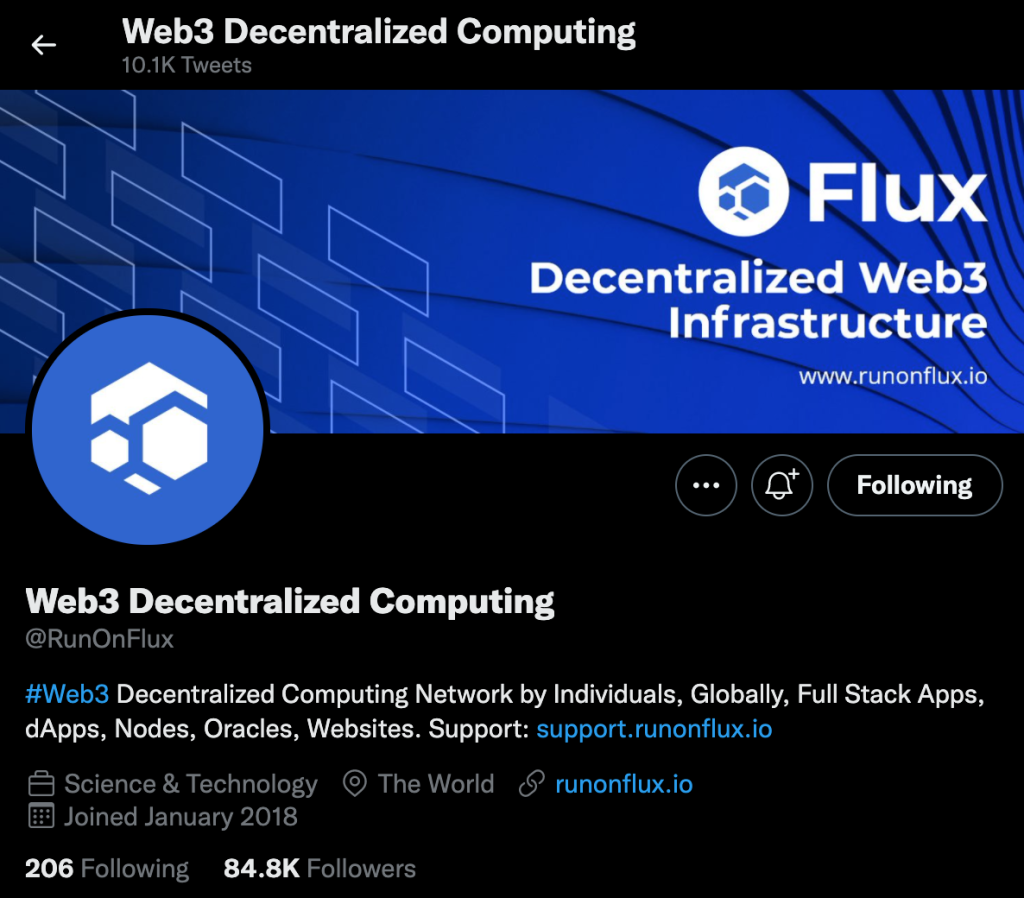
The Flux Networks (FLUX) – Twitter
Oracles are off-chain sensors. These protocols can receive and send data from the blockchain. They enable decentralized applications to provide more services and features to the market. As such, they are one of the fastest-growing areas of blockchain tech in use. However, these systems are fundamentally flawed because they operate in a centralized manner in most instances.
Flux is a community-driven and open-source platform that doesn’t really answer to legacy financial institutions, venture capital investors, or even big tech companies. The project is very committed to creating a truly decentralized future by simply staying independent and continuing the push for disruption and innovation in blockchain technology
Flux provides multiple layers of decentralization to improve security performance, and oracle data streams within the market. This technical structure makes Flux resilient to system failures as all data is kept in redundancy. It also reduces censorship as there is no group to block or confiscate your transactions.
Clarity and Simplification
Another issue that Flux helps to remove is new user confusion. The protocol provides a simplified decentralized cloud infrastructure that developers can build on. Notably, the system enables users to leverage Flux features while retaining their original blockchain.
Ready to Scale
Flux was built from the ground up to be scalable. The network supports high-performance applications and the execution of advanced smart contracts across network nodes in a responsive manner. It runs on Linnux as it is the most stable operating system. It is used by most big businesses. Flux is building an enterprise level infrastructure that will handle scaling efficiently.
Benefits of Flux Network (FLUX)
There are many benefits you gain from using Flux. For one, this computational network offers developers a suite of decentralized services and blockchain solutions. These options reduce programming time and errors for developers. Additionally, they provide users with an efficient, safe, and optimized base layer while saving funding.
Passive Rewards
The Flux Network (FLUX) provides access to passive rewards. Users can secure rewards in the form of FLUX tokens by operating a node or mining. Nodes execute smart contracts on the blockchain, whereas, miners add transactions to the ledger and validate its state. The network is set up to split block rewards 50/50 between GPU miners and node operators. FLUX crypto is easier to mine than some others, including the popular platforms Ethereum and Bitcoin for instance, as it only require three gigabytes of GPU RAM. The number of nodes in operation has increased dramatically recently. Also, Flux has almost completed its halving.
Related: https://fluxhighway.com/flux-node-profitability-increase-halving-and-titan-rewards-march-2022/
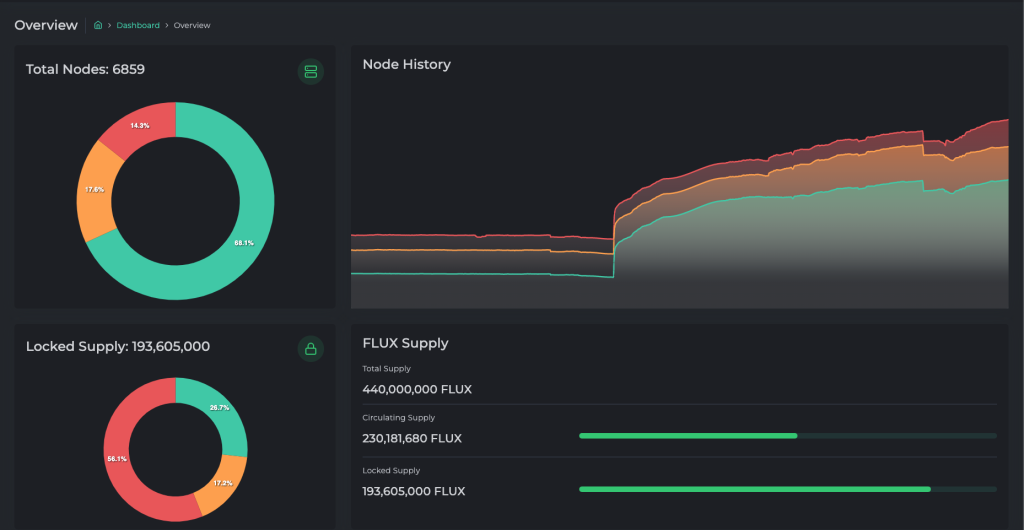
The Flux Network (FLUX) – Blockchain Statistics
Developer Support
Anyone can create a Flux Dapp. Notably, the developers even encourage third parties to contribute to the Flux ecosystem. Best of all, developers can integrate FLUX features on other blockchain applications which makes it simple to launch programs on this high-performance network.
Interoperability
Protocols like Flux help to provide interoperability within the DeFi sector. Interoperability helps to improve innovation because it enables developers to leverage other platforms to simplify their processes. It also improves DeFi adoption via added access to these networks.
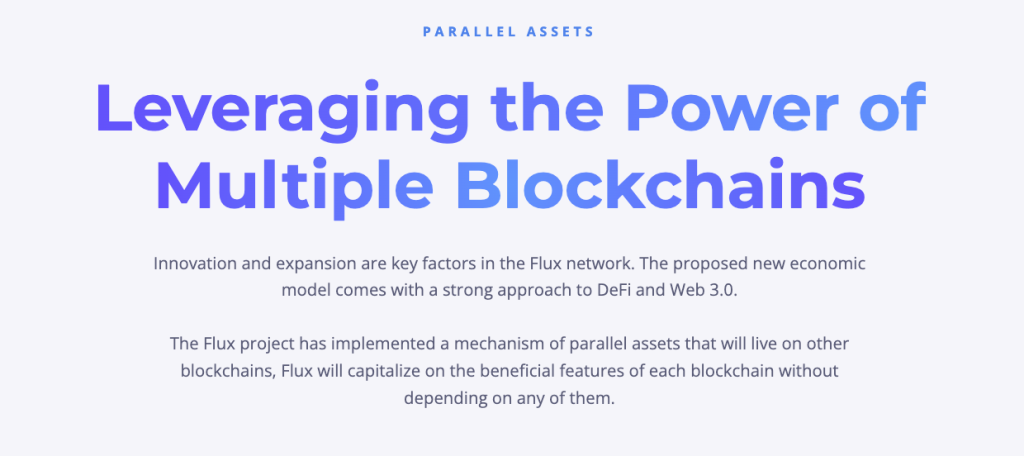
The Flux Networks (FLUX) Interoperability
How Does Flux Network (FLUX) Work
The Flux blockchain provides the network with its security and stability. This decentralized public blockchain is the ideal infrastructure for Dapp developers. The network relies on internationally located nodes to complete transactions and process smart contracts while remaining secure.
FluxNodes
Flux Nodes are a critical component of the system. These nodes can be hosted on enterprise-grade hardware which improves participation and performance. There are bare metal, cloud-based, ARM64, and VPS servers hosting Flux nodes. In total, the network has 6859 nodes at this time. They are launching a new program, Titan, which will allow one person to have up to eight nodes on a single IP address.
FluxOS
FluxOS is a second-layer cloud operating system that leverages API access and other core features to provide developers access to Flux regardless of their network. The protocol is compatible with any blockchain and any hardened dockerized applications. Users can deploy Dapps, check nodes, view network statistics, resources, and vote on network upgrades using this protocol.
The FluxOS represents a significant change in strategy from developers. It improves the functionality and usability of the system and opens the door for large-scale adoption of these features across a wide variety of decentralized networks.
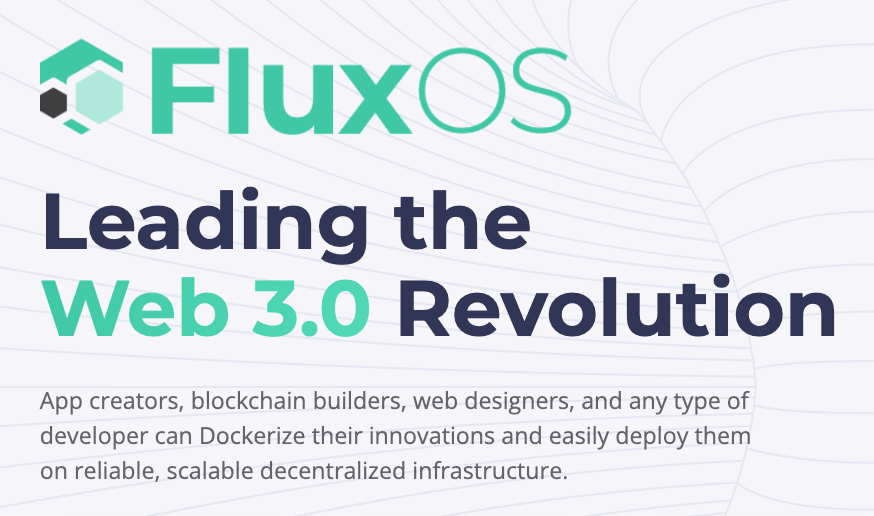
Zelcore Wallet
The platform has its own blockchain application suite and self-custodial, multi-asset wallet called Zelcore. The wallet provides non-custodial services to crypto users. Non-custodial wallets are the more secure because you are the only one who has access to your crypto. This multi-asset wallet enables you to store, send, and receive all your favorite tokens. Zelcore integrates into the Flux ecosystem in a seamless manner. You can also access core features and services from the dashboard.
Governance
Flux is a community-led project that leverages a decentralized voting system called a DAO. Decentralized Autonomous Organizations take corporate structure and replace all personal and actions with smart contracts. They are very popular in the DeFi sector at this time because they give developers and users more input as to the direction of the project.
In the Flux Network (FLUX) you need to hold FLUX to gain voting rights. The more FLUX you hold in your Zelcore wallet and the more say your vote holds. This structure is beneficial to the network because it ensures that those who are financially invested in the network get heard as they have the most to lose.
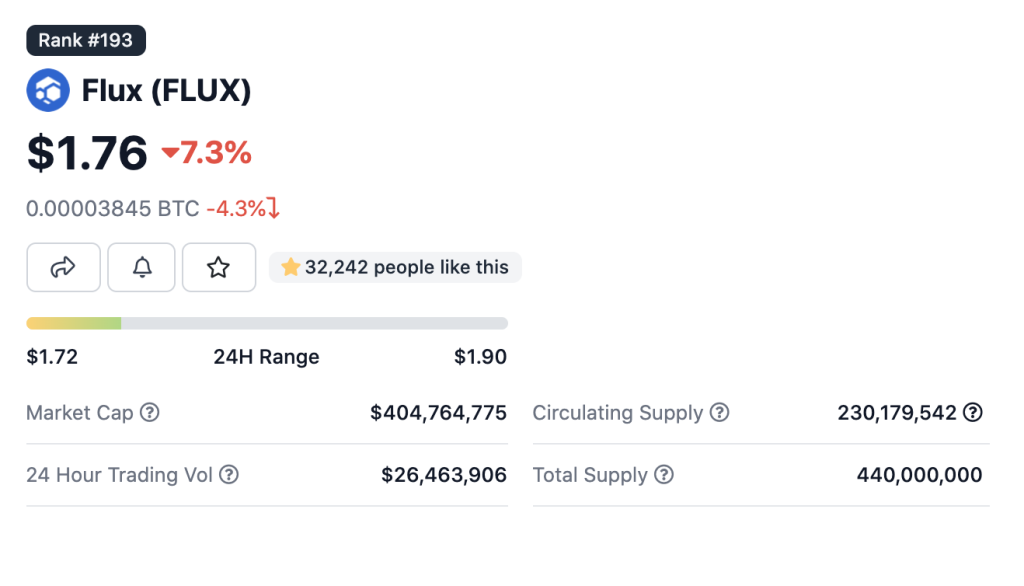
FLUX – CoinGecko
FLUX
FLUX is also the native utility token of the platform which can be used for a variety of purposes on the platform – including network governance, paying for network fees, and is received as rewards for mining. This flexible asset serves a variety of roles within the system. You can use FLUX for purchasing resources, collateralizing nodes, and sending and receiving transactions. All network nodes and miners receive their rewards in the form of FLUX.
Consensus
The Flux Blockchain leverages a Proof-of-Work (PoW) consensus mechanism to remain valid. Proof-of-Work consensus mechanisms are the most secure networks but they require more energy to operate. The PoW system used by Flux has been optimized to improve performance across the trustless data layer.
Where to Buy Flux Network (FLUX)
Flux Network (FLUX) is available on the following exchanges:
Binance – Best for Australia, Canada, Singapore, UK and most of the world. USA residents are prohibited from buying Flux Network (FLUX). Use Discount
BinanceUS – Flux is now on this exchange too – for USA residents.
Gate.io – This exchange was established in 2013, and is one of the more popular & reputable exchanges. Gate.io currently accepts USA residents (excluding New York & Washington State).
KuCoin – This exchange currently offers cryptocurrency trading of over 300 other popular tokens. It is often the first to offer buying opportunities for new tokens. This exchange currently accepts International & United States residents.
Also on: Bittrex, Pancakeswap, MEXC, CoinEx, Coinmetro, and HotBit
Flux Provides a Valuable Service to the Market
The builders behind Flux Network (FLUX) have performed their analysis into how centralized oracles can wreak havoc on a blockchain and set out to build a better robust system. Remember, it’s vital that information that gets entered on the blockchain correctly as many networks are unable to be changed. Faulty information from centralized oracles has already caused issues. Flux eliminates these problems and provides developers with a high-performance alternative. As such, you can expect this network to see continued adoption.
Although the material contained in this website was prepared based on information from public and private sources that Fluxhighway.com believes to be reliable, no representation, warranty or undertaking, stated or implied, is given as to the accuracy of the information contained herein, and Fluxhighway.com expressly disclaims any liability for the accuracy and completeness of the information contained in this website.
Via this site: https://www.securities.io/investing-in-the-flux-network-flux-everything-you-need-to-know/
